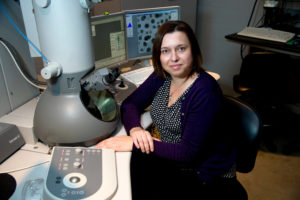Researchers at Purdue University, a partner institution of the Indiana Clinical and Translational Sciences Institute (CTSI), are developing an in-home COVID-19 test that would allow immediate results by relying on a smart sensor for coronavirus detection.

Lia Stanciu, PhD, professor of materials engineering at Purdue University
The COVID-19 sensor technology is based on the work of Lia Stanciu, PhD, professor of materials engineering at Purdue, who developed the technique of identifying viruses through their resistance to electronic materials. This approach is different than the widely used antigen and PCR tests that are normally used.
The technology being used to develop this sensor approach, was originally funded by an Indiana CTSI project development team (PDT) in 2014, when the research idea was presented for developing a sensor for detecting the presence of the mosquito-borne Zika virus.
Recalling the previous work on the Zika virus, Indiana CTSI Navigator located at Purdue University, Tommy Sors, PhD, connected Stanciu with a company called Identify Sensors. Together, they formed a new company to work on the COVID-19 sensor called Identify Sensors Biologics.
“The ability to connect this historic work of the Indiana CTSI and form a new company, highlights the important roles of the Indiana CTSI navigators in forming public/private partnerships beyond the Indiana CTSI and its partner universities of IU, Purdue and the University of Notre Dame,” said Sharon Moe, MD, co-director of the Indiana CTSI.
The new technology that evaluates saliva for the presence of COVID-19 within minutes, includes a reasonably-priced sensor, which is anticipated to cost $21 for multiple uses, along with a $130 reader that functions on two AA batteries. The results are automatically sent to your smart phone, along with a disclaimer that requests permission for your results to be reported to the appropriate federal agencies like the Centers for Disease Control.
“This sensor technology is a great example of what the Indiana CTSI does well, in terms of translating research into a variety of uses from Zika to COVID, that benefit the community,” said Sarah Wiehe, MD, MPH, co-director of the Indiana CTSI.
The COVID-19 test is still months away from a potential emergency use authorization from the FDA. However, it’s easy to see its ability to translate to even more uses for detection of viruses beyond COVID-19.
“New product plans include the ability to detect the flu, MRSA and spoiled food,” said Sors. “It’s evolving to be quite substantial.”
